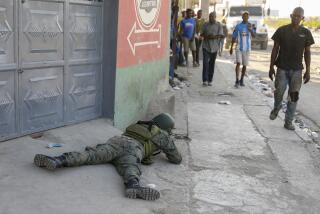U.S. Weighs New Sanctions Against Defiant Haiti Regime
- Share via
WASHINGTON — Acknowledging that an international drive to restore democracy to Haiti is on the verge of collapse, President Clinton said Friday that his Administration will take more “vigorous” action soon if the military-backed government of the impoverished island does not reverse course and accept outside human rights monitors.
Clinton and Secretary of State Warren Christopher refused to give up on a mediation effort by the United Nations and the Organization of American States, but they showed growing frustration at the Haitian regime’s disdain for attempts to bring elected President Jean-Bertrand Aristide back to power.
“I am committed to restoring democracy to Haiti,” Clinton said during a joint press conference with Canadian Prime Minister Brian Mulroney.
Clinton provided no details, but Christopher said the Administration is considering ways to tighten the porous economic sanctions that have, so far, made life more difficult for the island’s poor without dislodging the military government or the tiny wealthy elite that backs it.
In a symbolic demonstration of support for Aristide, Christopher met at the State Department with the radical Roman Catholic priest who took office two years ago Friday and was ousted seven months later.
Referring to the junta that has ruled Haiti since Aristide’s overthrow, Christopher said, “Those who hold illegal power there should know that they are swimming against the tide of history and that they will not prevail.”
Aristide’s lawyer, former Rep. Michael Barnes (D-Md.), said it is up to the United States, the United Nations and the OAS to impose meaningful sanctions.
“Part of the problem with the embargo has been that a number of European countries have not observed it,” Barnes said, citing France as one example. He said that mandatory U.N. sanctions should close off that loophole.
“No one is seriously considering military action,” Barnes added.
For the past several weeks, the U.S. government had counted on the U.N.-OAS mission headed by former Argentine Foreign Minister Dante Caputo to restore democracy. Last month, Caputo obtained an agreement from the military government to send up to 500 international human rights monitors to the island to discourage repression and pave the way for Aristide’s return.
But this week, when Caputo went to Haiti to complete the arrangements, Prime Minister Marc Bazin demanded a long list of new restrictions on the monitors and said they would be allowed in only after all sanctions are lifted. Caputo angrily broke off the talks.
While denouncing the military regime for rampant human rights violations, Clinton acknowledged that officials and supporters of the junta are afraid that Aristide’s backers will try to get even if the ousted president regains power.
“We have to be able to restore democracy in a way that convinces everybody that their human rights will be respected and, for an interim period, protected,” Clinton said.
More to Read
Sign up for Essential California
The most important California stories and recommendations in your inbox every morning.
You may occasionally receive promotional content from the Los Angeles Times.













